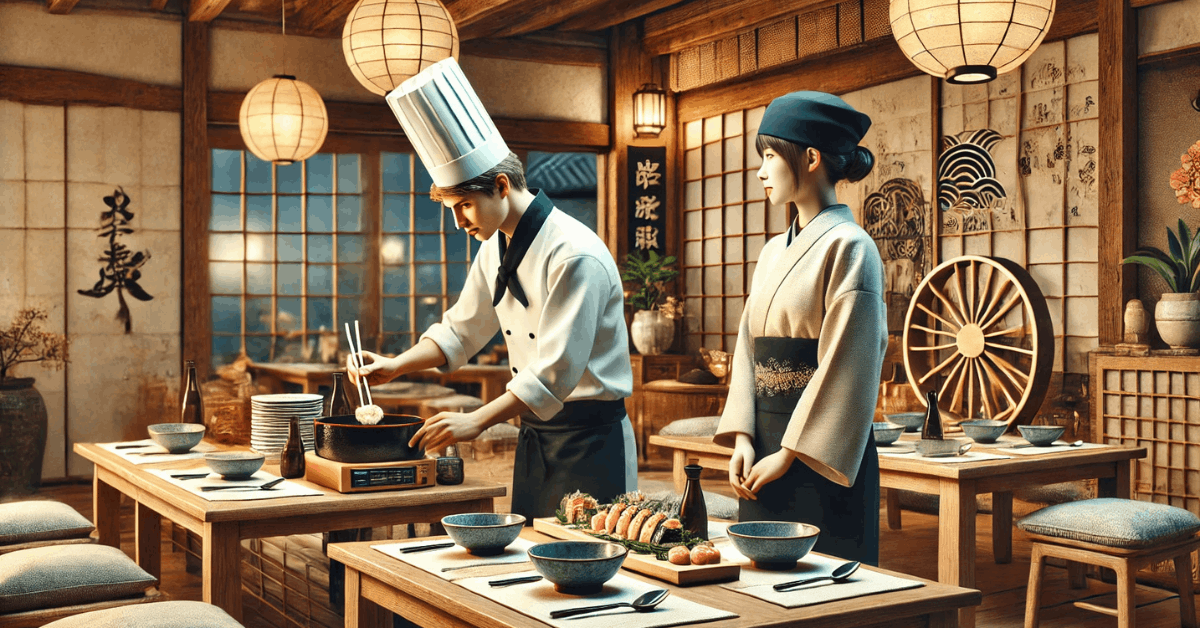Restaurant jobs in Japan offer a gateway to one of the world’s most renowned culinary cultures. This article provides insights into Japan’s dynamic restaurant industry’s opportunities, skills, and paths.
Whether you want to refine your craft or start fresh, this guide equips you with essential knowledge to pursue your passion.

Types of Jobs in Japan’s Restaurants
The restaurant industry in Japan offers diverse roles to match varying skills and career goals. Each position provides a chance to gain valuable experience in Japan’s unique dining culture.
- Chef or Cook: Cooks and chefs work at various levels, including line cooks, sous chefs, and head chefs. They handle food preparation, maintain kitchen quality, and focus on culinary precision.
- Restaurant Manager: Managers oversee operations, coordinate staff, and ensure smooth service. They need strong leadership and organizational skills to handle daily challenges.
- Waitstaff or Servers: Servers assist guests in traditional and modern dining environments. Their role includes delivering meals and ensuring a positive customer experience.
- Dishwasher or Busser: Dishwashers and bussers focus on kitchen cleanliness and organization. These entry-level roles can lead to career advancement within the restaurant.
- Bartender: Bartenders work in bars, izakayas, or upscale venues, mixing drinks and serving customers. Attention to detail and knowledge of beverages are essential.
- Sushi Chef: Sushi chefs specialize in preparing sushi with meticulous skill. This role requires years of training and a deep understanding of Japanese culinary techniques.
Key Skills for Success in Japan’s Restaurants
To thrive in Japan’s restaurant industry, mastering specific skills is essential. These include technical abilities, cultural understanding, and personal qualities that align with the high standards expected in the field.
Culinary Skills and Certifications
Proficiency in cooking techniques and culinary precision is critical for most roles. Specialized certifications like those in Japanese cuisine add credibility and improve career prospects.
Practical experience often complements formal qualifications.
Customer Service Experience
Strong customer service skills are highly valued in Japan, as customer satisfaction is a priority.
This includes attentive service, clear communication, and handling feedback professionally. Providing a positive experience is part of maintaining the restaurant’s reputation.
Language Skills
Basic Japanese proficiency ensures smooth communication with coworkers and customers. Learning key phrases and improving your fluency over time makes daily tasks easier.
Language skills also help in understanding instructions and cultural nuances.
Cultural Knowledge
Understanding Japanese dining etiquette and customer preferences shows respect and professionalism. Key aspects include serving meals correctly, addressing guests properly, and meeting high service standards.
Awareness of cultural expectations fosters a better working environment.
Work Ethic
A strong work ethic is essential in Japan, focusing on speed, efficiency, and teamwork. Meeting high expectations requires a commitment to quality and attention to detail. Collaborative efforts contribute to smooth operations and overall success.
Education and Training
Education and training are essential to building a strong foundation in Japan’s culinary field. Both formal programs and practical experience offer valuable pathways to enhance your skills.
Culinary Schools and Apprenticeships in Japan
Culinary schools in Japan provide structured programs to learn techniques and traditions of Japanese cuisine.
Apprenticeships offer hands-on experience, allowing you to master skills under experienced professionals. Both options help build credibility and expertise.
On-the-Job Training vs Formal Education
On-the-job training allows you to gain practical experience working directly in the industry.
Formal education provides a deeper understanding of techniques and culinary principles. Many professionals combine both methods to achieve a well-rounded skill set.
Importance of Learning Japanese Cooking Techniques
Mastering Japanese cooking techniques, such as knife skills and presentation, is vital to success. These techniques highlight attention to detail and tradition, which are highly respected in the field.
Work Environment in Japan’s Restaurants
Working in Japan’s dining industry is demanding but rewarding. The environment emphasizes discipline, efficiency, and high-quality service.
Fast-Paced and High-Pressure Settings
The pace in kitchens is intense and demanding, requiring speed and precision. Workers must adapt quickly to maintain consistent quality under pressure.
The Importance of Teamwork and Hierarchy
Teamwork is highly valued, with clear roles defined by a hierarchical structure. Respect for seniority and collaboration ensures smooth operations and effective communication.
Differences Between Casual Dining and Fine Dining
Casual dining focuses on efficiency and volume, serving a wide range of guests. Fine dining emphasizes precision and presentation, catering to guests expecting a premium experience. Both settings require attention to detail and professionalism.
Work Visa Options for Foreign Workers
Foreign workers interested in Japan’s dining industry must secure the proper work visa. Eligibility and application processes vary depending on the job role and qualifications.
Eligibility for Work Visas in Japan
Eligibility depends on meeting specific requirements, such as skills and employment status.
- Educational Background: A relevant degree or training in culinary arts is often required.
- Job Offer: Securing a formal job offer from an employer in Japan is essential.
- Work Experience: Proven experience in the industry can strengthen your visa application.
Types of Visas Available
Different visa types are suited for various roles in the dining industry.
- Skilled Labor Visa: This is for workers with specific expertise, such as sushi chefs.
- Specialist in Humanities Visa: Suitable for managerial or administrative roles.
- Temporary Work Visa: For short-term employment or training in Japan.
The Process of Applying for a Work Visa
Applying for a work visa involves preparing proper documentation and meeting requirements.
- Step 1: Obtain a job offer and an employer’s sponsorship.
- Step 2: Prepare necessary documents, including proof of qualifications and job details.
- Step 3: Submit your application through the Japanese embassy or immigration office.
Salary and Benefits
The pay and perks of working in Japan’s dining industry vary based on role and experience. Benefits like housing and insurance add value but require consideration of job demands.
Average Salary Ranges for Different Roles
Salaries differ across roles, reflecting skill level and responsibilities.
- Dishwasher/Busser: ¥1,000–¥1,200 per hour.
- Waitstaff/Server: ¥1,200–¥1,500 per hour.
- Bartender: ¥1,500–¥2,000 per hour.
- Chef/Cook: ¥2.5 million–¥4 million annually.
- Restaurant Manager: ¥4 million–¥6 million annually.
- Sushi Chef: ¥3 million–¥6 million annually, depending on experience.
Benefits: Housing, Meals, Health Insurance
Employers often provide extra perks that ease living costs.
- Housing: Some offer accommodations or rent subsidies.
- Meals: Complimentary meals during shifts are common.
- Insurance: Health and employment insurance are often covered.
Work-Life Balance: Long Hours and Overtime Considerations
Due to high service expectations, working in Japan’s dining industry can involve long hours and overtime. Balancing personal life may be challenging, but efficient time management can help mitigate stress.
Challenges and Rewards
Working in Japan’s dining industry has difficulties but offers unique growth opportunities. Overcoming barriers and meeting expectations brings personal and professional fulfillment.
Language and Cultural Barriers for Foreigners
Foreign workers often face challenges adapting to the Japanese language and etiquette. Learning basic phrases and observing cultural norms helps bridge gaps and build strong relationships.
High Expectations and Pressure in the Business
The dining industry in Japan operates under strict standards, demanding precision and excellence. Workers must adapt to fast-paced environments and meet high customer expectations consistently.
The Reward of Mastering Japanese Cuisine and Expanding Skills
Mastering Japanese culinary techniques brings a sense of achievement and expertise. Gaining skills in a respected field opens up new career opportunities and enhances your professional value.
Final Take on Restaurant Jobs in Japan
Restaurant jobs in Japan provide a unique chance to immerse yourself in culinary excellence and a rich cultural environment.
From mastering traditional techniques to growing your career in a demanding yet rewarding industry, the opportunities are vast. Success requires dedication, skill, and adaptability to meet the high standards expected in Japanese dining.
Embracing these challenges can unlock your full potential and take your culinary passion to the next level.











